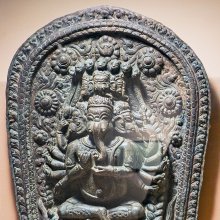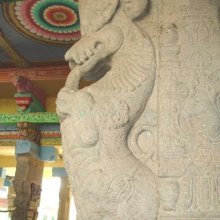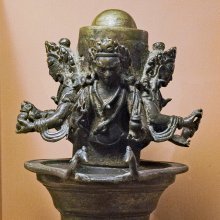Body: 3 definitions
Introduction:
Body means something in Hinduism, Sanskrit, Jainism, Prakrit. If you want to know the exact meaning, history, etymology or English translation of this term then check out the descriptions on this page. Add your comment or reference to a book if you want to contribute to this summary article.
Images (photo gallery)
(+144 more images available)
In Hinduism
Shaivism (Shaiva philosophy)
Source: SOAS University of London: Protective Rites in the Netra TantraThe Conception of the Body in medieval India and the Netratantra.—The body (in Sanskrit: deha) was vulnerable to demons and reliant on deities for its continued existence. [...] For the Tantric practitioner, the divinized body is part of a psychophysical organism. Through practice, the Mantrin moves from the gross (sthūla) body to the subtle (sūkṣma) though breath practices and consciousness until he reaches its highest manifestation (para).
The body is less important than form (rūpa or svarūpa). Form includes the physical body as only a small part of the individual. A person's form includes their sthūla, sūkṣma, and para manifestations as well as their social bodies, including caste and name. The protective rites of the Netratantra reveal that the name of an individual overcome with illness works as a ritual substitute for that person. This is not to say that the physical body of the person is not important. The body is central to ritual practice. When the Mantrin places the mantra upon the body (nyāsa), he creates a Tantric body that itself becomes a ritual tool. The body and the mantra become fused. This allows the mantra to heal the body.

Shaiva (शैव, śaiva) or Shaivism (śaivism) represents a tradition of Hinduism worshiping Shiva as the supreme being. Closely related to Shaktism, Shaiva literature includes a range of scriptures, including Tantras, while the root of this tradition may be traced back to the ancient Vedas.
Yoga (school of philosophy)
Source: ORA: Amanaska (king of all yogas): A Critical Edition and Annotated Translation by Jason BirchThe Body is denoted by the Sanskrit term Deha, according to the Haṭhatattvakaumudī by Sundaradeva: a large compendium on Yoga in roughly 2000 Sanskrit verses quoting from Yoga texts, Upaniṣads, Epics, Purāṇas, Dharmaśāstras etc.—Accordingly, “Now Rājayoga is explained as far as the [fourth stage called] Niṣpatti in Haṭhayoga, for the delight of Yogins who have naturally ascended to Yoga through the [stage] of Niṣpatti in [Haṭha]yoga. [It is for those Yogins] whose breath, internal fire, body (deha) and mind has been mastered and whose unequivocal realization [of the highest reality] has occurred”

Yoga is originally considered a branch of Hindu philosophy (astika), but both ancient and modern Yoga combine the physical, mental and spiritual. Yoga teaches various physical techniques also known as āsanas (postures), used for various purposes (eg., meditation, contemplation, relaxation).
In Jainism
General definition (in Jainism)
Source: ORA: Amanaska (king of all yogas): (Jainism)The Body cane be denoted by the Sanskrit term Kāya, according to verse 12.42 of Hemacandra’s Yogaśāstra.—Accordingly, “At the time of the arising of the no-mind state, the Yogin experiences the body (kāya), which is as though it does not exist, as though [it were] separated, burned, flying up and dissolved”.

Jainism is an Indian religion of Dharma whose doctrine revolves around harmlessness (ahimsa) towards every living being. The two major branches (Digambara and Svetambara) of Jainism stimulate self-control (or, shramana, ‘self-reliance’) and spiritual development through a path of peace for the soul to progess to the ultimate goal.
See also (Relevant definitions)
Starts with: Body heat, Body part, Body Witness, Bodya.
Ends with: Adamantine body, Buddha-body, Dead body, Human body, Threefold Body, Upper body.
Full-text (+15777): Sharira, Kaya, Deha, Dhatu, Kalevara, Roman, Angaraga, Anga, Kayika, Murti, Sukshmasharira, Sarvanga, Kapha, Anganyasa, Sharirin, Kshetrajna, Angaja, Navadvara, Vapu, Dharmakaya.
Relevant text
Search found 550 books and stories containing Body; (plurals include: Bodies). You can also click to the full overview containing English textual excerpts. Below are direct links for the most relevant articles:
Bhagavati-sutra (Viyaha-pannatti) (by K. C. Lalwani)
Part 6 - On the life of the earth-bodies < [Chapter 5]
Part 1 - On respirations (ucchvāsa) < [Chapter 1]
Part 2 - Nine sections on matter consciously transformed < [Chapter 1]
Vaisheshika-sutra with Commentary (by Nandalal Sinha)
Sūtra 4.2.5 (Body is two-fold: sexually produced, and asexually produced) < [Chapter 2 - Of Tangible Atomic Products]
Sūtra 3.2.17 (Above answered—continued) < [Chapter 2 - Of the Inference of Soul and Mind]
Sūtra 7.2.21 (Priority and Posteriority, how prodiced) < [Chapter 2 - Of Number, Separateness, Conjunction, etc.]
Tattvartha Sutra (with commentary) (by Vijay K. Jain)
Verse 2.43 - Four bodies can be attained simultaneously < [Chapter 2 - Category of the Living]
Verse 2.36 - five types of bodies (śarīra) < [Chapter 2 - Category of the Living]
Verse 2.37 - Subtle bodies (sūkṣma) < [Chapter 2 - Category of the Living]
Guhyagarbha Tantra (with Commentary) (by Gyurme Dorje)
Text 6.22 (Commentary) < [Chapter 6 (text and commentary)]
Text 6.12 (Commentary) < [Chapter 6 (text and commentary)]
Text 3.17 (Commentary) < [Chapter 3 (text and commentary)]
Jain Science and Spirituality (by Medhavi Jain)
2.3. Physical Bodies and Psychical Bodies < [Chapter 6 - Spirituality in Jainism]
5.5. Types of Metaphysical Bodies < [Chapter 5 - Science in Jainism]
4.2. Universe in Jain Philosophy < [Chapter 5 - Science in Jainism]
Brahma Sutras (Shankaracharya) (by George Thibaut)
Related products
(+378 more products available)











